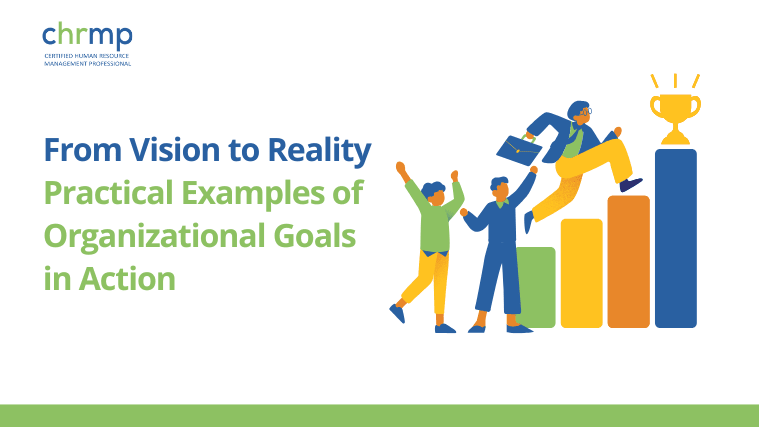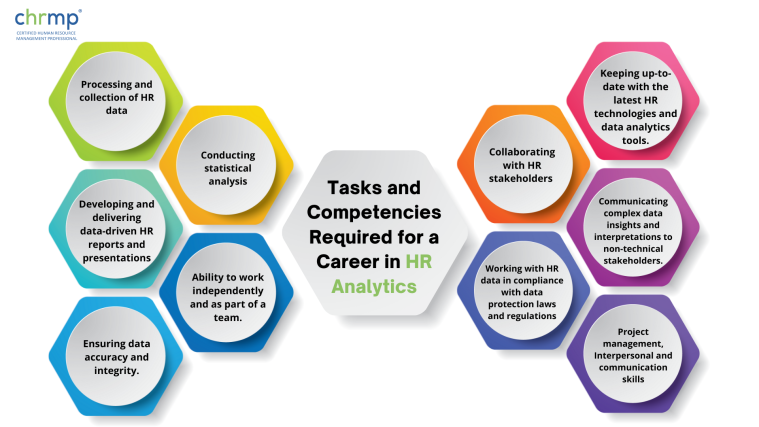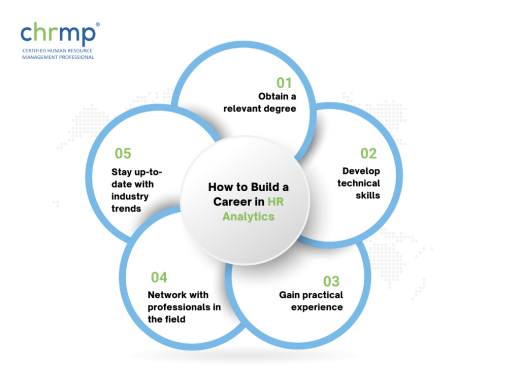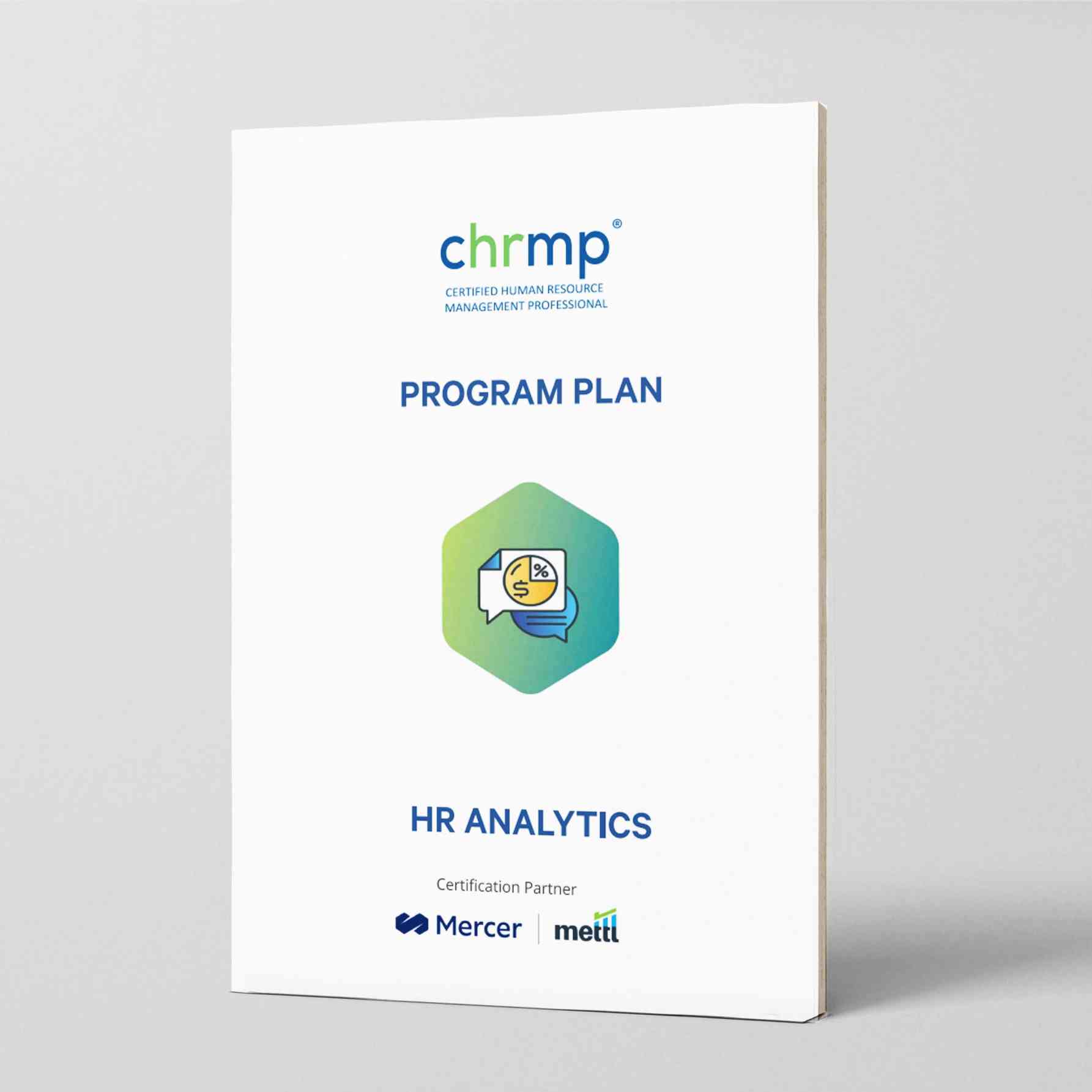

Human Resources (HR) is among the key functions of any organization, for the employees are the biggest asset of any business setup. HR professionals approach their work with certain HR tools, methods and skills, and HR Analytics has emerged as the key area in the present rapidly changing business landscape.
We will explore the world of HR Analytics, the skills, qualifications and knowledge needed to start a successful career in this field, and the various opportunities available for HR Analytics professionals in this blog.
Let’s get started.
A career in HR Analytics is challenging and rewarding, and a unique blend of skills and knowledge from human resources, data analysis, and business strategy is required.
HR Analyst, HR Data Analyst, People Analytics Manager, HR Business Partner, or HR Technology Consultant are the various roles in which HR Analytics professionals work. Data analysis tools and techniques to collect, process, and analyze data related to HR processes like recruitment, performance management, employee engagement, and retention are used in this field.
A successful HR professional must have a strong foundation in statistics and data analysis and a good understanding of HR processes and best practices. Proficiency in data visualization, reporting, and communicating complex data insights to non-technical stakeholders is a must. To work as part of a team and have have good project management skills is also a must.
Large corporations, consulting firms, and HR technology companies employ these HR Analytics professionals. Depending on the organisation’s policies, they may work remotely or in an office setting.
A career in HR Analytics can be fulfilling and challenging for individuals interested in an amalgamation of data analysis and human resources. With the growing demand for data-driven HR decisions, this field is poised for quantum leaps in the coming years.
As mentioned, a career in HR Analytics requires combining technical and interpersonal skills. Some of the tasks and competencies required for this career include:

The salary of an HR Analytics professional varies depending on several factors such as level of experience, location, organization, and job title. According to Glassdoor, the average base pay for HR Analysts in the United States is around $70,000 per year, while the average base pay for a People Analytics Manager is around $120,000 per year.
Salary ranges can vary significantly based on company size, industry, and location. For example, a large multinational corporation might offer a higher salary for a similar role than a smaller company or non-profit organization. Salaries are also based on the level of education and certifications that an individual has acquired.
HR Analytics is a growing field with a high demand for skilled professionals, and salaries in this field tend to be competitive. It would be prudent to research and compare salaries across different organizations and locations to better understand the average salary range for a specific role.
Building a career in HR Analytics requires an amalgamation of education, technical skills, and practical experience.
Here are some steps to help you build a career in HR Analytics:

1. Obtain a relevant degree:
A bachelor’s or master’s degree in HR, data science, business analytics, statistics, or a related field can provide a strong foundation for a career in HR Analytics. Additionally, earning certifications in HR Analytics and data analysis can help demonstrate your expertise to potential employers.
2. Develop technical skills:
A sound technical foundation is a must. Technical skills such as proficiency in statistical software, data visualization tools, and programming languages such as Python, R, and SQL are essential for a career in HR Analytics. Developing these skills through coursework, online learning platforms, and hands-on experience can help build a strong technical foundation.
3. Gain practical experience:
Internships, volunteer work, and entry-level positions in HR or data analysis can provide valuable practical experience in HR Analytics. This experience can help build skills, establish professional contacts, and help get to know the field better.
4. Network with professionals in the field:
Networking and building professional relationships with HR Analytics professionals can provide insights into the industry, career paths, and job opportunities. Joining professional organizations and attending industry conferences, seminars and webinars.Social media platforms like LinkedIn help connect with professionals and build a network of contacts.
5. Stay up-to-date with industry trends:
The HR Analytics field constantly evolves, and staying up-to-date with the latest industry trends, technology, and best practices is essential to build a successful career. Reading about your field in industry publications, attending webinars and seminars and participating in online forums can help you stay informed about emerging trends, patterns and new developments in the field.
To conclude, building a career in HR Analytics needs an amalgamation of education, technical skills, practical experience, networking, and a process of ongoing learning. Learning and updating must never stop. Learning computer programming languages like SQL, R, and Python is also a requirement. Following these steps can build a strong foundation for a successful career in this growing and dynamic field.
As an HR analytics professional, proficiency in various tools and technologies is crucial for effectively analyzing HR data and deriving insights.
Some of the key tools and technologies that every HR analytics professional should be familiar with include the following:

1. Statistical software:
Statistical software such as R, Python, or SPSS can be used for data analysis, visualization, and statistical modelling. These tools enable HR analytics professionals to perform advanced statistical analyses on HR data to identify patterns, trends, and correlations.
2. Data visualization tools:
Data visualization tools such as Tableau, Power BI, or QlikView allow HR analytics professionals to create interactive and visually appealing dashboards and reports to present HR data meaningfully. This helps in communicating HR insights and findings to stakeholders clearly and compellingly.
3. Excel:
Excel is a commonly used tool for HR analytics professionals to perform basic data analysis, cleaning, and manipulation tasks. It is also useful for creating simple charts and visualizations.
4. HRIS (Human Resources Information System):
HRIS is a software system that helps HR professionals manage employee data, including employee profiles, payroll information, performance data, and other HR-related information. Familiarity with HRIS systems, such as SAP SuccessFactors, Workday, or Oracle HCM Cloud, is essential for HR analytics professionals to extract relevant data for analysis.
5. Machine learning platforms:
Machine learning platforms such as sci-kit-learn, TensorFlow, or PyTorch can be used for building predictive models and conducting advanced data analysis. Understanding and applying machine learning techniques can help HR analytics professionals predict employee turnover, identify high-potential employees, and make data-driven decisions.
6. Data visualization libraries:
Libraries such as Matplotlib, Seaborn, Plotly in Python, or ggplot2 in R, provide additional capabilities for creating customized and interactive visualizations to showcase HR data effectively.
7. Text analytics tools:
Text analytics tools such as Natural Language Processing (NLP) libraries in Python or R, like NLTK or TextBlob, can be used to analyze unstructured HR data, such as employee feedback, performance reviews, and social media comments, to gain insights and extract meaningful information.
8. SQL (Structured Query Language):
SQL is a powerful language used to manage and analyze relational databases. Proficiency in SQL allows HR analytics professionals to extract, manipulate, and analyze HR data from databases, such as extracting employee data, aggregating data, and performing complex queries.
9. Data integration tools:
Data integration tools such as Talend, Informatica, or Microsoft Power Query can be used to integrate data from multiple sources, such as HRIS, payroll systems, surveys, and other HR-related data sources. Data integration is a critical step in the HR analytics process to ensure data consistency and accuracy.
10. Cloud-based analytics platforms:
Cloud-based analytics platforms, such as Google Cloud Platform, Amazon Web Services (AWS), or Microsoft Azure, provide scalable and cost-effective solutions for storing, processing and analyzing large volumes of HR data. Familiarity with these platforms can be beneficial for HR analytics professionals working with big data or in organizations that utilize the cloud-based infrastructure.
These are some of the key tools and technologies that HR analytics professionals should be familiar with. However, it’s important to note that the specific tools and technologies used may vary depending on the organization’s requirements, industry, and the HR analytics projects being undertaken. Continuous learning and keeping up-to-date with the latest advancements in tools and technologies are essential for HR analytics professionals to stay relevant and excel in their careers.
CHRMP (Certified Human Resource Management Professional) HR Analytics is a certification program that provides training to aspiring professionals and equips them with the skills and knowledge needed to build a career in HR Analytics. The program is designed to equip HR professionals with the technical & analytical skills required to make data-based decisions that can improve HR practices and drive business outcomes to greater heights.
In this it covers a range of topics, including data analysis, data visualization, predictive modelling, and HR metrics. Participants also learn how to use HR data to identify workforce trends, improve employee engagement performance at the same time, curb absenteeism and high turnover ratios, and make data-driven decisions and not intuition-based ones, that can improve the financial metrics and productivity of the overall business.
The CHRMP HR Analytics program is designed for HR professionals who have a basic understanding of HR practices and want to develop their skills in data analysis and HR metrics. The program is suitable for HR generalists, HR business partners, HR managers, and other HR professionals who want to transition to a more data-driven approach to HR.
The CHRMP HR Analytics program is typically delivered through a combination of online and classroom training, with participants having access to a range of resources, including case studies, interactive simulations, and real-world examples. Participants get the opportunity to network with other professionals in the field and learn from experienced instructors who have practical experience in HR. Networking always helps.
Upon completion of the CHRMP HR Analytics program, participants earn a certification that demonstrates their expertise in HR Analytics. This certification can help professionals stand out in a competitive job market and demonstrate their commitment to the HR field.
The CHRMP HR Analytics program is a comprehensive training program that provides HR professionals with the technical and analytical skills needed to build a successful career in HR Analytics. The program is designed to provide participants real-world knowledge & skills that can be applied to improve HR practices, strategies and initiatives to drive business outcomes to greater heights.
1. What technical skills are required for a career in HR Analytics?
A: Technical skills required for HR Analytics include proficiency in statistical software, data visualization tools, and programming languages like as Python, R, and SQL. Other important skills include data management, data modelling, and data analysis.
2. What industries are hiring for HR Analytics roles?
A: Many industries, including healthcare, finance, technology, and retail, are hiring for HR Analytics roles. As the use of data-driven decision-making in HR becomes more widespread, demand for HR Analytics professionals is expected to grow across many different industries.
3. What are some common job titles for HR Analytics professionals?
A: Common job titles for HR Analytics professionals include HR Analyst, People Analytics Manager, HR Data Analyst, HR Business Partner, and HR Metrics Analyst.
In conclusion, a career in HR Analytics offers a unique opportunity for HR professionals to apply data-based approaches to human resources management. By using data analysis, data visualization, and a little further extrapolative predictive modelling, HR Analytics professionals can help identify workforce trends, improve employee engagement, curb turnover rates, and absenteeism and make data-driven decisions that can improve overall business performance.
A successful career in HR Analytics requires a combination of education, technical skills, practical experience, networking, and ongoing learning. With the growing demand for HR Analytics professionals across many different industries, pursuing a career in this field can offer a challenging and rewarding path for HR professionals looking to advance their careers. Many industries, like healthcare, finance, technology, and retail, hire for HR Analytics roles.
© 2007-2025 CHRMP| All Rights Reserved | Powered by Ripples Learning & Research Private Limited

Fill in the below details to get a CHRMP HR Analytics Program Plan.
